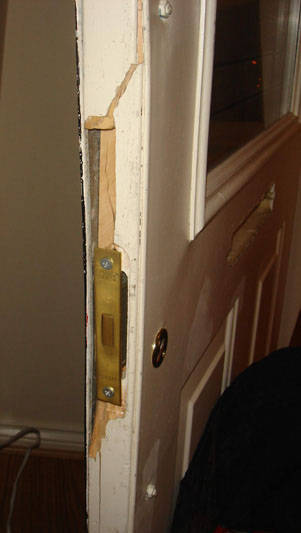
A question that seems to continuously land on my doorstep (pun intended, sorry): can tenants legally change the door locks?
In short, it depends. So let’s take a look into the details…
There’s a lot of confusion around this issue, and I’d be remiss if I didn’t hold my hands up and admit doubt.
For a long time I was under the impression that tenants could freely change the locks without any issue, but after devouring the heated comments section in this wonderful blog post on LandlordLaw, which has notable contributions by legal minds, I’ve taken a 180 degrees turn.
Please note, everything in this blog post is just *my opinion” based on the information I have read, so is no shape or form should it be constituted as legal advice.
Page contents
- Can tenants change the locks?
- Why are changing locks not permitted?
- So when can tenants justifiably change the locks?
- Tenant’s right to live in “quiet enjoyment”
- What does the tenancy agreement say about changing locks?
- If the locks are changed without cause or permission
- Evicting tenants that change locks
Generally speaking, can tenants change the locks?
From what I’m aware of, no. They can’t.
There is no general right to change locks and exclude the landlord from the premises without *cause* (and even the ’cause’ is up for debate on whether it’s justifiable). Changing the locks without permission could mean the tenant is:
- Breaching the terms of the tenancy agreement
- Committing “criminal damage” on the basis that the property is being modified without the landlords permission (even if damage isn’t caused to the property during the procedure)
Essentially, tenants generally don’t have any reason or rights to change the locks and withhold the keys from the landlord unless they have an actual reason to (which I discuss further down).
Why are changing locks not permitted?
I’m not *entirely* sure on this (I couldn’t find a definitive answer), but I suspect it’s because of the following:
- It can make it difficult for landlords to enter the property to fulfil their duties, many of which they are legally obligated to fulfil.
- It prevents landlords from accessing the property in cases of emergency.
- Changing the locks could be constituted as making changes to the property, which generally speaking, tenants are not permitted to do without consent.
As a landlord, the above reasons for why tenants can’t change the locks without reason make sense to me.
So when can tenants justifiably change the locks?
There’s no clear cut answer from what I’ve read, and it’s mostly circumstantial as to whether changing of locks is justifiable:
- If the tenant is granted explicit permission by the landlord (permission should be granted in writing)
- If there is a clause in the tenancy agreement which permits it (there usually isn’t. On the contrary, there’s usually a clause which stipulates it’s NOT permitted)
- If the tenant feels harassed by the landlord. For example, if the landlord frequently turns up to the property unannounced and without any real reason.
- If the keys have been lost and consequently the tenant’s safety is compromised. In this case, the tenant should inform the landlord and resolve the problem accordingly, and the landlord should not be withheld from the new set of keys.
If the tenant does change the locks they should preserve the original fixtures and fittings. Any damages caused by the tenant during the procedure is recoverable from the security deposit, even if they have justifiable reasons for changing the locks.
I once actually had a tenant that changed the front door locks. This was the outcome of her handy D.I.Y work:

The door was completely trashed.
I feel inclined to believe that she fitted the new locks with a mechanical sledgehammer.
To her displeasure, I ended up using her security deposit to replace the door. You can read more about that dramatic saga here: I’ve Fallen Out With My Ex-Tenant Over Her Security Deposit.
Tenant’s right to live in “quiet enjoyment”
Just as a reminder: it is the tenant’s statutory right to live in “quiet enjoyment”, which essentially means the landlord should not constantly disturb or harass the tenant while living in the property.
Landlords are not entitled to enter the tenant’s living area without written permission as they have the right to use the property as their home. However, the landlord has the right to ‘reasonable’ access to carry out repairs they are responsible for, but should always ask for the tenant’s permission first, and should give at least 24 hours’ notice.
Breaching this lawful right – especially on a frequent basis – could give tenants justifiable reasoning to change the locks.
What does the tenancy agreement say about changing locks?
Most standard tenancy agreements specifically forbid tenants from changing the locks. But it’s worth checking to see what yours says.
If there is no specific clause mentioning the locks, or specifically about changing the locks, there is usually a clause about forbidding making changes to the property – and I believe that covers locks.
If the locks are changed without cause or permission
If the tenancy agreement specifically forbids changing the locks or making changes to the property, the landlord is entitled to change the locks back and charge the tenant for the expenses incurred during the process. The cost is typically deducted from the deposit at the end of the tenancy.
Evicting tenants that change locks
If you’re concerned that your tenant has changed the locks with the intention of refusing you reasonable access to the property to carry out essential duties, such as inspections, viewings or to attend repairs and maintenance issues, I would personally look into terminating the tenancy.
In the event that the tenant unreasonably prevents access, you can apply to the county court for an injunction.
Disclaimer: I'm just a landlord blogger; I'm 100% not qualified to give legal or financial advice. I'm a doofus. Any information I share is my unqualified opinion, and should never be construed as professional legal or financial advice. You should definitely get advice from a qualified professional for any legal or financial matters. For more information, please read my full disclaimer.


 Landlord Products / Services
Landlord Products / Services





























That is rather crazy photo, ok if they want to change the locks then yeh no problem, but not getting a professional in to do it!? We've never seen anything this odd over here yet..
Iain,
http://www.spectrumproperties.co.uk